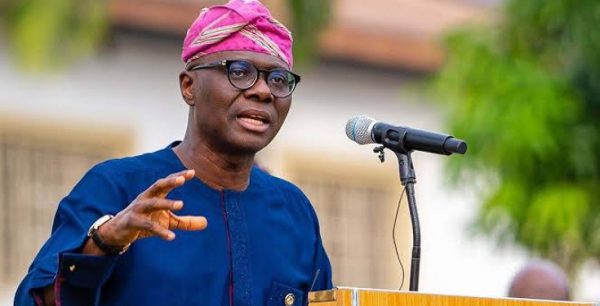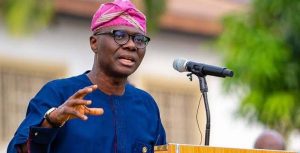Governor Babajide Sanwo-Olu of Lagos State said on Monday that the need for a new revenue sharing formula among the three tiers of government is very straightforward.
It is self-justifying and in no way controversial, he added.
Mr Sanwo-Olu stated these in his remarks at the opening of a two-day South-west Zonal public hearing on Review of Revenue Allocation Formula organised by The Revenue Mobilisation Allocation and Fiscal Commission (RMAFC) in Lagos.
The governor said the demand by federating states is for a sharing formula that is just, fair and equitable; reflecting the contribution of stakeholders to the common purse.
He said the states also wanted a revenue formula that enhances the capacity of states and local governments to deliver high-quality services and the full dividends of democracy to the greatest number of Nigerians.
According to him, “the truth remains that the review of the current formula is long overdue, as the prosperity of Lagos State directly or indirectly has its multiplying effect on the Southwest region and on the entire country as a whole.”
“The best way to guarantee national progress and development is by paying attention to subnational development because the national is a summation and a reflection of the subnational,’’ he said.
Mr Sanwo-Olu re-emphasised the request by Lagos State to be accorded “Special Status’’ in recognition of its huge financial obligations to infrastructure and provision of basic amenities for the increasing population of its residents and its preeminent contribution to national coffers.
He said the call, which had been re-echoed at different fora and at various levels and tiers of government, could not be overemphasised, especially against the backdrop of the current economic realities of the country.
According to him, “it will actually be unfair to expect Lagos State to bear the heavy burden on its own and, therefore, it is necessary to give due consideration to all the variables that support its advocacy for a Special Status”.
“Lagos State was the epicentre for COVID-19, the same way it was for Ebola virus some years ago.
“The management of these unforeseen occurrences comes with huge responsibilities and financial commitments on the part of the state government.
“Although we have put that experience behind us and forged ahead, the reality of these unfortunate incidents remains with us; resources that should be committed to other areas of need are now being used for the restoration of damaged public facilities.
“It will be totally unfair for Lagos State to be left alone to bear these huge expenses without assistance from the centre.
“COVID-19 pandemic is another issue that has once again, supported the justification for Lagos State to be accorded the privilege of a special status.
“As much as this affects the entire country, it is a fact that the degree of havoc caused by this virus differs from state to state,’’ Mr Sanwo-Olu said. He added that the call for Lagos State to be accorded special status was not a selfish proposition.
“It is in the best interest of the country and all Nigerians for Lagos State, which accounts for about 20 per cent of the GDP and about 10 per cent of the nation’s population, to continue to prosper.
Mr Sanwo-Olu stressed that it was in no doubt that Lagos State is the nation’s commercial capital, and population centre.
The governor stated that the level of funding required to service the state’s social and public infrastructure was so significant that it would be difficult for the state to bear the burden for much longer under the present revenue-sharing arrangement.
He explained that Lagos is more than just another state in the Nigerian federation as there is no tribe in the country that has no significant stake in the state.
He said as the former capital of the country for 77 years (compared to the 28 years that Abuja has been the FCT), Nigeria’s largest metropolis still bears the heavy brunt of being home to all Nigerians; irrespective of age, class, gender, religious affiliation or tribe.
“There are several statistics that show the number of people that come into Lagos every day; there are clear indications that most of these people migrate with the intention to make Lagos their new home and in pursuit of personal dreams the city-state seemingly possesses.
“This portends additional responsibilities on the government.
Additionally, Lagos still harbours a huge number of federal establishments which could not be moved to Abuja. These include military cantonments and barracks, Police, Customs, Immigration, Civil Defence, Prisons, Road Safety and security/intelligence establishments,’’ he said.
Mr Sanwo-Olu appealed to all to approach the review process with open minds and ensure that the right parameters were factored in.
In his address, Chairman RMAFC, Elias Mbam, lauded Governor Sanwo-Olu and Lagos State for accepting to host the public hearing.
Mr Mbam said RMAFC began the process of reviewing the subsisting Vertical Revenue Allocation Formula in line with changing realities as the last review was done in 1992.
He enjoined stakeholders to participate actively and effectively as the commission would take all views and recommendations into consideration.



